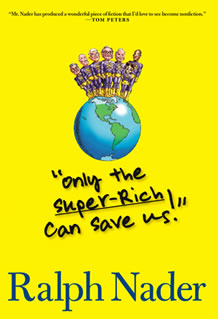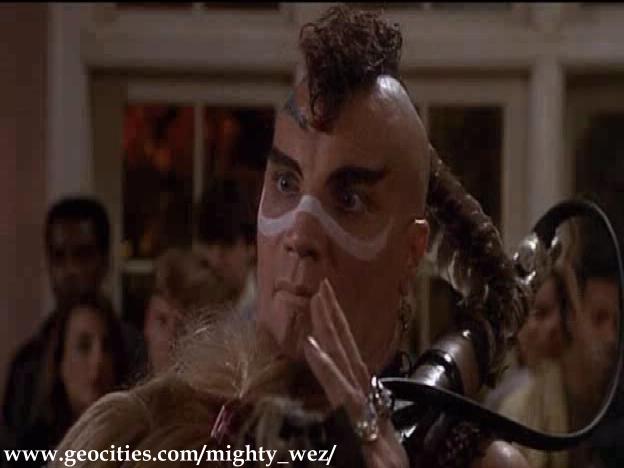Wednesday, December 29, 2010
Twitter - what's it for?
Sunday, December 26, 2010
Radio Freefall
 My Christmas read (on paper, not a Kindle, amazingly) was Matthew Jarpe's debut novel Radio Freefall from 2007. It's labelled cyberpunk, but it's really more cyberprogrock. The lead character, after all, is named after a Jethro Tull song, Aqualung, and it's filled with references to all sorts of music.
My Christmas read (on paper, not a Kindle, amazingly) was Matthew Jarpe's debut novel Radio Freefall from 2007. It's labelled cyberpunk, but it's really more cyberprogrock. The lead character, after all, is named after a Jethro Tull song, Aqualung, and it's filled with references to all sorts of music. Wednesday, December 15, 2010
Business head vs business heart
- Walk away. This is obviously the logical thing to do. After all, it's why you do a business plan, so you can find out before you start whether it's going to be worth while. The down side is that you'll never get to do your cool idea. And if it was that cool, you're going to be really pissed off when someone else does it, and even more pissed off when they make money at it. I've lost count of the number of ideas I've walked away from, only to see someone else be successful at them years later. So, the answer is clearly to...
- Do it anyway and hope the rewards come later. Perhaps you screwed up your planning, perhaps it'll pay better than you think, or maybe circumstances will change. Or maybe it will lead on to something else that pays off. Think of it as an investment. Except that of course not all investments pay off. You might think your idea is cool, but nobody else does, and you're just pouring money down the drain. But that's okay, because you can...
- Do it anyway and just accept the losses. If it's fun, and you can afford it, treat it as a hobby. If it makes some money back, so much the better. Of course, if you end up spending more than you can afford, and it turns out not to be as much fun as you thought, that's a real downer, so obviously it's more sensible just to walk away. But then... yeah, we're right back where we started.
Saturday, December 11, 2010
Assorted food-related observations
- I love making my own stock with chicken carcasses, ham bones, and so on. It seems pointless, given how cheap and easy it is to buy the stuff, but I find it satisfying to use as much as I can from the animal. I also enjoy the bit where I pick the bones as clean as they can get.
- On a similar note, I get immense satisfaction from cooking with left-overs, odds and ends, and whatever I can find in the back of the kitchen cupboards. It feels like I'm getting something for nothing.
- I can taste a spicy dish and tell you exactly what spices are in it, but I cannot, for the life of me, identify the grape variety in a glass of wine.
- Of all coffees, I enjoy African coffees the most. And I think Hawaiian Kona is overrated.
- I really like going to the Mexican market and loading up on tomatilloes and assorted chile peppers. I think I have ten different varieties of chiles in my kitchen right now, none of which is habanero or jalapeno.
- My favourite meat is venison, preferably slow cooked in either port or brandy. Or both.
- My slow cooker is my favourite kitchen utensil. It feels good to cook while I make breakfast and then know I'll have a delicious meal on demand later that night.
- I cannot cook omelettes. I can't make scrambled eggs in a frying pan either.
- I'm lousy at cooking steak.
- I rarely eat deep fried food.
- I pride myself on being able to cook food from around the world, but my knowledge of French cuisine is practically nil. I can probably cook more Iraqi, Nigerian, or Polish dishes than French dishes.
- My favourite pizza topping is pepperoni, mushrooms, anchovies and jalapeno, with extra mozzarella. These days I prefer thin crispy pizzas to deep thick ones, and I like to eat the crusts, as long as they're properly crunchy.
- I prefer tawny to ruby port. And I'm partial to a good sherry. On the other hand, I never drink Scotch whisky.
- My favourite fruit is mango.
- I loathe raw tomatoes, except in salsa with plenty of lime and chilli.
- I almost never cook desserts or cakes, but I make a totally kick-ass baklava.
- The combination of meat and fruit is something I love experimenting with.
- I often make vegetarian meals, even though I'm not a veggie. I just like the variety and don't feel the need to include meat.
- I find cooking aubergines (eggplants) really tricky, especially the big Greek ones.
- I cannot eat seafood (but fish is OK) or tofu.
- I had a very satisfying moment a few years ago in a restaurant, when I realised that I was no longer choosing food because I hadn't tried it before; instead, I was choosing dishes which I couldn't make at home because I can't get the ingredients or I don't have the utensils. Now, I tend to choose food based on the restaurant's recommendation.
Tuesday, December 7, 2010
Buzz!
No-one sends an idea unless:
- they get it (see below)
- they want it to spread
- they believe that spreading it will enhance their status
- the effort necessary to spread the idea is less than the benefits.
No-one "gets" an idea unless:
- the first impression demands further investigation
- they understand the foundation ideas necessary to get the new idea
- they trust the sender
That's why viral marketing and internet memes are so shallow. And, most importantly, ideas never spread because they're important to the originator.

What Every Good Marketer Knows
- People don’t buy what they need. They buy what they want.
- You’re not in charge. And your prospects don’t care about you.
- Good marketers tell a story.
- Effective stories match the worldview of the people you are telling the story to.
- Choose your customers. Fire the ones that hurt your ability to deliver the right story to the others.
Saturday, November 27, 2010
Hulu Plus
Monday, November 22, 2010
Kindling

As you probably know, I'm a bit of a book lover. I've had a book in my hand since I was two years old, and can't imagine life without reading. Last month, however, I finally succumbed to the lure of the e-book, and got myself a Kindle 3G with wi-fi. I'll admit, I've been hugely prejudiced against them, and only got one because I needed it for work. After all, what can compare with the touch, smell, visual appeal, and convenience of a proper paper book? I hate reading books on computer screens, and can't imagine myself ever preferring an e-book over the real thing.
Saturday, October 30, 2010
ThisIsWhyYou'reFat
Friday, October 29, 2010
On Leadership

- Vision: a leader looks beyond the immediate situation and gives people something to aim at. Not just a wishy-washy "things will be better," but a definite, achievable set of goals. Like putting a man on the moon by the end of the decade, or achieving a society in which black and white people are treated equally.
- Affirming values: a leader stands for something that people want to believe in. He is a living example of what people should be. What he's trying to do reflects what's important to that society.
- Inspiring trust: people follow a leader because they believe in him. They are prepared to let him take the tough decisions, and they will back him, because they trust him to do the right thing.
- Accountability: as part and parcel of being trusted, the leader accepts that he is accountable to his followers. The buck stops with him. If he screws up, he will admit it and let people judge him on his record.
- Motivation: a leader makes people want to achieve. When he speaks, people act. They don't just go back to their normal lives, or grumble to their friends. They do something.
- Managing: a good leader doesn't act alone. He has to get others to do what needs to be done. He has to deal with crises, manage budgets, and delegate work. A good manager isn't always a good leader, but a good leader has to be a good manager.
- Achieving unity: leadership is often about building consensus and achieving compromise. You can't lead half a country. Well, you can, but then you get either civil war or the political stalemate we've had in Britain and America for the last few decades.
- Knowing the system: you can't manage or achieve unless you know the ways of politics. (Just watch Yes, Prime Minister.)
- Decisiveness: leaders don't um and aah. They don't have time. They cut through the crap and get on with the job.
- Explaining: people need to understand what's happening, especially if their leader is going to take them through a difficult time. A leader needs to be able to explain what he's doing, and why. It's not the same if it comes from a subordinate.
- Being a symbol: the leader is the person people look up to. Once he takes that office, he's not just himself. He's something more.
- Representing the group: the leader is an ambassador, and other people's perception of the whole society is coloured by that. Look at how Europeans treated Americans under George W. Bush, and how they now treat Americans under Obama. Same people, different leader.
- Supporting their followers: one of the key qualities of a leader is to make his followers believe that he is doing his best for them. He is working on their behalf. He is enabling them to do what they want. Even if it's a tough path, he has to convince people that he is acting for their benefit, not his own.
Wednesday, October 27, 2010
In at the deep end
Monday, October 25, 2010
Treehackers
Lunch-time conversation with colleagues turned to the idiosyncracies of the Mac App-store's guidelines on acceptable content - and how to work round them. Apparently depictions of violence against animals or people are out; but no mention of plants. Nor are your enemies allowed to be any identifiable real-world cultural group; but apparently nothing prevents *your* side from being one. So we concluded that you might be allowed a hyper-violent video game in which the enemy is a force of triffids and ents defending the forests from evil loggers who've hired you as a mercenary to fend off the mobile plants while the loggers go to work raping the rain-forests. Since it's common "knowledge" that the nazis all ran away to hide out in South America, *our* side can safely be jack-booted thugs with hakkenkreutz insignia. We just have to be careful not to have any of them being killed horribly; so the ents and triffids must be killing humanely, thereby further driving home the "you are on the side of evil" message. Make it sufficiently over the top, I suspect it could actually be very popular, just for subverting all the silly censoriousness (not just Apple's) about violent video games. Remembering that some on this list have contacts in the gaming industry, I hereby dedicate this silliness to the public domain. As to this mail's subject: despite its similarity to the word "tree-hugger", especially when pronounced, it'd be more faithfully translated as lumberjack - or "tree-hacker". Eddy.
Tuesday, October 19, 2010
Chief Culture Officer





Monday, October 18, 2010
Only the super-rich can save us!
 The world's pretty messed up right now. Everything's controlled by a few huge corporation who are to all intents and purposes above the law. Governments answer to the interests of big business. And big business answers to the interests of a few billionaires. The rest of us really don't matter a damn, and neither does the planet. Everything is sacrificed in the interests of profit.
The world's pretty messed up right now. Everything's controlled by a few huge corporation who are to all intents and purposes above the law. Governments answer to the interests of big business. And big business answers to the interests of a few billionaires. The rest of us really don't matter a damn, and neither does the planet. Everything is sacrificed in the interests of profit.Sunday, October 17, 2010
Rework
 Are you an entrepreneur? Managing a small software company? Thinking about getting into a start-up? Frustrated by the way your work/life balance is shot to hell?
Are you an entrepreneur? Managing a small software company? Thinking about getting into a start-up? Frustrated by the way your work/life balance is shot to hell? Monday, October 11, 2010
National Coming Out Day

Friday, October 8, 2010
It's crap, but is it art?
 A lot of my friends have been to see Exit Through the Gift Shop this week. I didn't go, largely because I'm not a fan of Banksy, or street art in general, but also because I decided to go to a different art show that evening, which I thoroughly enjoyed. After hearing their reports of the film, I'm really glad I didn't go. I think I'd have hated it.
A lot of my friends have been to see Exit Through the Gift Shop this week. I didn't go, largely because I'm not a fan of Banksy, or street art in general, but also because I decided to go to a different art show that evening, which I thoroughly enjoyed. After hearing their reports of the film, I'm really glad I didn't go. I think I'd have hated it.Monday, August 30, 2010
Keep it clean
Saturday, July 10, 2010
Potted woodlouse

Collect a quantity of the finest wood-lice to be found, and drop them into boiling water, which will kill them instantly, but not turn them red, as might be expected. At the same time put into a saucepan a quarter of a pound of fresh butter, a teaspoonful of flour, a small glass of water, a little milk, some pepper and salt, and place it on the stove. As soon as the sauce is thick, take it off and put in the wood-lice. This is an excellent sauce for fish.
Thursday, July 1, 2010
Re yr msg
socmed comms r often poor way 2 get yr meaning across? twitter/fb/txt FAIL :)
Wednesday, June 30, 2010
What does online friendship mean?
Monday, June 28, 2010
The soporific screen
I don’t know what it is, but these days I find it almost impossible to watch an entire movie without – quite literally - falling asleep. Whether I’m in the cinema or at home, I can’t make it all the way through. Sometimes I can’t even get through a single episode of a TV show. It’s becoming really annoying.
I don’t think it’s just tiredness, though that certainly doesn’t help. I find myself dozing off in matinees or when watching something late afternoon or early evening. It’s certainly not boredom – I end up dozing through the end of films I’m really enjoying. It’s not that I can’t concentrate for two straight hours – I can read a book or play a game all day without dropping off, but half an hour after a movie starts, I start to feel sleep creeping up on me.
I thought for a while it was a reaction to darkness. Dave & Darien both prefer to watch movies with the lights off, so I tried insisting that we leave the lights up. That certainly made things better, and now I can usually get most of the way through a movie or into the second episode of TV before drifting away. I tried changing my posture, and that makes a difference too. If I’m lazing on a couch with my feet up, I tend to crash out fairly rapidly. Sitting upright in an armchair or sitting on the floor helps. However, neither of those is sufficient.
I was fascinated to read in Wired this week how using the Internet is changing the way our brains process information. We’re becoming more and more adept at skimming, at multi-tasking, and at dealing with rapidly changing data sources. After working in machinima for seven years, I now find myself thinking of a ten-minute movie as a long piece, and am getting more and more used to two-minute movies. Watching a full-length feature is rather like trying to listen to an opera or a symphony after being immersed in a culture of three-minute pop songs and advertising jingles.
There was a time when I would sit in a chair or lie on the floor and just listen to an hour-long symphony. Nowadays I’d want something else to do with my hands and eyes while I was listening, and would probably be getting restless after the first movement. When I listen to music now, I’m usually cooking, reading, web-surfing, chatting online, working, or doing housework. (Or, more likely, several of these at once.) I’d probably stay awake through movies if I treated them as background in the same way.
Part of the problem, I suppose, is that watching a movie is completely passive and non-interactive. With a book, at least I’m turning the pages, I control the pace at which I read, I can easily skip back a few pages, and I can get up, make coffee, and read anywhere. I'm imagining the scene, turning words into mental images and sounds. With a movie, I’m completely captive. It demands my attention, but requires that I do absolutely nothing else and gives me everything I need to see and hear. As a result, when I watch a movie, it’s as if my brain is saying to me as soon as I relax, “nope, nothing to do here, Matt, might as well go into stand-by mode”.
Strangely, I can sit by the shore of a lake, in a forest clearing, on a beach, or on top of a hill, and just sit, silently, thinking or meditating for hours without going to sleep. By contrast, I can lie in bed in the darkness for hours, and my brain races insanely, no matter how tired I am. My preferred insomnia cure is to get up, put on a movie, and fall asleep on the couch.
It's perplexing. And, as I said, annoying.








